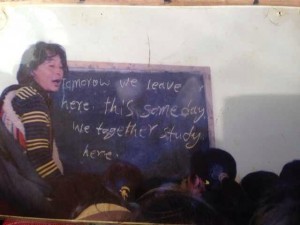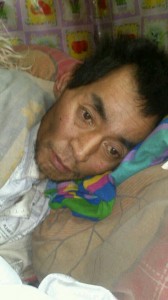Goshul Lobsang, a Tibetan schoolteacher and protester recently released from a Chinese prison on “medical parole,” has died as a result of the torture and neglect suffered in detention. “He could not say anything, but simply folded his hands and died” reports a source close to the family.
Lobsang, the son of a nomadic Tibetan family from Machu County, Kanlho Prefecture, in Tibet’s Amdo region, was arrested and sentenced to 10 years in prison in December 2010 for his leadership of local protests during the 2008 Tibetan uprisings, and for a subsequent meeting in which he challenged local Chinese authorities regarding the post-2008 security clampdown.
A March 31 report from the Dharamsala, India based Tibetan Centre for Human Rights and Democracy (TCHRD) reports that while in prison, Lobsang was beaten, tortured, and subjected to food and sleep deprivation. The report also makes clear TCHRD’s belief that he was given chemical injections to cause and increase pain. A source close to the family states that upon his release, Lobsang “…was literally reduced to skin and bone. He could not walk. He could not eat or drink. He could not even utter a single word.”
The death of Tibetan political prisoners while on “medical parole” from Chinese custody is not without precedent: Amnesty International and other human rights groups have reported numerous cases of political prisoners dying in Chinese prisons, or shortly after release, as a result of torture or neglect. Lobsang’s death is one of the first documented cases of medical torture of a Tibetan political prisoner.
Lobsang, in a September 2012 letter from prison, leaves behind a message of hope: “What I desire is a free world wherein people can enjoy a life of harmony…[not] a society wherein life is subjected to oppression…we must have a far-sighted vision and strong unity… a strong sense of faith in our culture and tradition…”
Gushul Lobsang’s Letter in full:
Prisoner of Clear Conscience
I have a family. I have siblings. I have a wife and children. For them, I have sincere love and affection, and for the sake of this love and affection, I am determined to sacrifice my life. But for the sake of our own people, even if I lose this love and affection, I will have no regrets. I am an ordinary nomad who loves his people, so I am willing to do anything for my people. I might lose this bony and haggard body that has suffered brutal pain and torture inflicted out of sheer hatred, I still will not have any regrets. I have the desire to follow in the footsteps of martyrs who expressed everything through flaming fire, but I lack courage [to do such a thing].
However, I don’t have the desire to bow my head in surrender to an environment, which denies freedom to speak out against lies and to struggle for equality. [Therefore], I fell into such a situation [of torture and suffering], for which I, an ordinary nomad, have no regrets. What I desire is a free world wherein people can enjoy a life of harmony – I don’t want an atmosphere of darkness, a society wherein life is subjected to oppression.
I have no regrets, although all of a sudden, I may be compelled to separate from the path of life that [I have been treading along] with my beloved mother, siblings, wife and children. I may have to depart with [feelings] of cold, heavy sadness, but I have no sense of guilt in my heart.
My clear conscience is my only asset in this world. I don’t possess anything other than this, and I don’t need anything other than this.
[But] my only regret that weighs heavily on my heart is the lack of profound sense of solidarity among our people, because of which we are unable to achieve a strong unified stand.
Fellow countrymen, we must have a far-sighted [political] vision and strong unity. We must have a strong sense of faith in our culture and tradition, and a sense of gratitude to those who have contributed so much to our nation.
Fellow countrymen of the Land of Snows, we must all uphold unity. May this unity be sustained for tens of thousands of years!
Goshul Lobsang
28 September 2012
Dingxi, Gansu






 Print
Print Email
Email